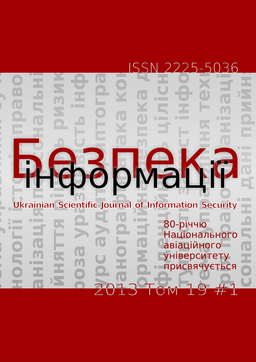Integer multiplication algorithm with delayed carry mechanism for public key cryptosystems
DOI:
https://doi.org/10.18372/2225-5036.19.4698Keywords:
multiplication of integers, software implementation, cryptographic transformation, cryptosystem, parallelism, delayed carryAbstract
Authors have offered the approach to increase performance of software implementation of integer multiplication algorithm, for 32-bit and 64-bit platforms. The approach relies on delayed carry mechanism of significant bit in sum accumulation. This strategy allows preventing necessity to consider the significant bit carry at the each iteration of the sum accumulation loop. The delayed carry mechanism enables to reduce the total number of additions and apply the modern parallelization technologies effectively.References
Diffie W., Hellman M. E., “New directions in cryptography,” IEEE Transactions on Information Theory, vol. IT-22, pp. 644–654, 1976.
Comba P. G. Exponentiation cryptosystems on the IBM PC // IBM Systems Journal. –Vol. 29(4). 1990. pp. 526–538.
Brown M., Hankerson D., Lopez J., Menezes A. Software implementation of the NIST elliptic curves over prime fields // Research Report CORR 2000–55. Department of Combinatorics and Optimization, University of Waterloo. –Canada: Waterloo, Ontario, 2000. –21p.
Hong S-M., Oh S-Y., Yoon H. New Modular Multiplication algorithms for fast modular exponeniation // Advances in Cryptology Proceedings of Eurocrypt ’96. –Springer-Verlag. 1996. – pp.166-177.
Avanzi R. M. Aspects of hyperelliptic curves over large prime fields in software implementations // Cryptology ePrint Archive. – Report 2003/253. – 2003. – 23p. Available from: http://eprint.iacr.org
Paar C. Implementation options for finite filed arithmetic for elliptic curve cryptosystems // Worchester Polytechnic Institute. –ECC’99. – 1999. – 31p. Available from: http://www.ece.wpi.edu/ research/crypto.html
Gaubatz G. Versatile Montgomery multiplier architectures. Master thesis: electrical and computer engineering. – 2002. – Worcester polytechnic institute. –101p.
Johann Großschadl, Roberto M. Avanzi, Erkay Sava, Stefan Tillich. Energy-Efficient Software Implementation of Long Integer Modular Arithmetic // Advances in Cryptology Prociding in CHES’2005. – Springer-Verlag. 2005. LNCS 3659. pp. 75-90.
Giorgi P. Izard T, Tisserand A. Comparison of Modular Arithmetic Algorithms on GPUs // ParCo'09: International Conference on Parallel Computing, France. – 2009. Available from: http://hal-lirmm.ccsd.cnrs.fr/lirmm-00424288/fr/
Weimerskirch A., Paar C. Generalizations of the Karatsuba Algorithm for Efficient Implementations. // Cryptology ePrint Archive. –Report 2006/224. –2006. –17p. Available from: http://eprint.iacr.org
Intel® 64 and IA-32 Architectures Optimization Reference Manual. Order Number: 248966-025. Available from: http://www.intel.com /content/dam/doc/manual/64-ia-32-architectures-optimization-manual.pdf
The OpenMP API Specification for Parallel Programming. Available from: http://openmp.org /wp/openmp-specifications/
OpenMP in Visual C++. Available at: http:// http://msdn.microsoft.com/en-us/library /tt15eb9t.aspx
The GNU Multiply Precision Library (GMP). Available from: http://gmplib.org
LiDIA. Available from: https://www.cdc. informatik.tu-darmstadt.de/en/cdc
Multiprecision Unsigned Number Template Library (MUNTL). Available from: http://mktmk. narod.ru/eng/muntl/muntl.htm
TinyECC: A Configurable Library for Elliptic Curve Cryptography in Wireless Sensor Networks. Available from: http://discovery.csc.ncsu.edu/ software/TinyECC
Galois Field Arithmetic Library. Available from: http://www.partow.net/projects/galois/
MPFQ: Fast Finite Fields Library. Available from: http://mpfq.gforge.inria.fr/
BBNUM. Available from: http://www.iw-net.org/index.php?title=Bbnum_library
FLINT: Fast Library for Number Theory. Available from: http://www.flintlib.org
Multiprecision Integer and Rational Arithmetic C/C++ Library (MIRACL). Available from: http://indigo.ie/~mscott
LibTom Projects: LibTomMath, TomsFastMath. Available from: http://libtom.org
Abusharekh A., Gaj K. Comparative Analysis of Software Libraries for Public Key Cryptography // Software Performance Enhancement for Encryption and Decryption, SPEED’2007. June 11-12, 2007.
Giorgi P., Imbert L., Izard T. Multipartite Modular Multiplication. Preprint. Available from: http://hal.archives-ouvertes.fr/lirmm-00618437/fr/
National Institute of Standards and Technology, Recommended Elliptic Curves for Federal Government Use, Appendix to FIPS 186-2, 2000. –43p.
NVIDIA. NVIDIA CUDA Programming Guide 2.0. Available from: http://developer.download.nvidia.com/compute/DevZone/docs/html/C/doc/CUDA_C_Programming_Guide.pdf
OpenCL The open standard for parallel programming of heterogeneous systems. Available from: http://www.khronos.org/opencl
Intel Threading Blocks. Available at: http://software.intel.com/en-us/articles/intel-tbb

